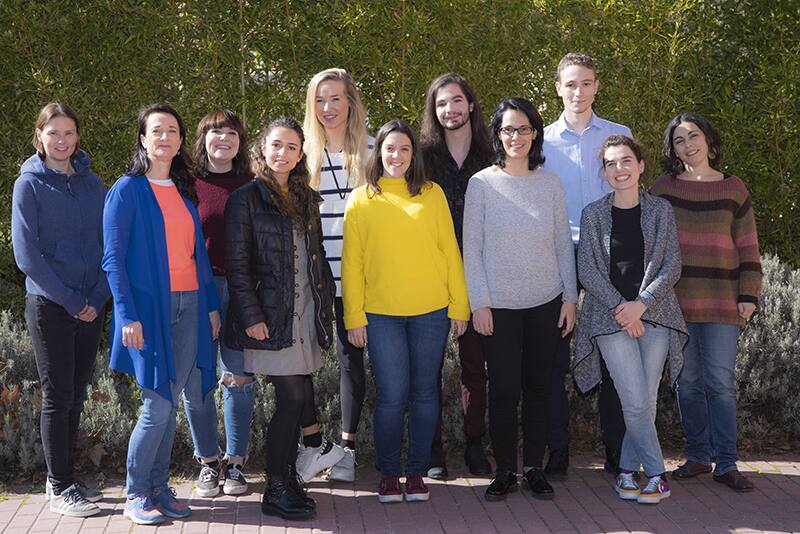Patricia Boya
"You have to enjoy wwhat you do, research is not easy and pursuing a tenure track position is a marathon for which one has to train continuously."
I'm Patricia Boya, and this is why I research.
Patricia Boya is an Assistant Professor at the Centro de Investigaciones Biológica. She studied biology at the University of Texas, Austin, and Universidad de Navarra, Spain, where she received her doctoral degree in Cell Biology in 2000. She completed her postdoctoral training as a Marie Curie fellow in the laboratory of Guido Kroemer, MD, PhD., in Paris. Having set up all the tools for autophagy research and discovering the cytoprotective role of autophagy in mammalian cells, Patricia returned to Spain in 2005 with a Ramón y Cajal contract at the Centro de Investigaciones Biológicas (CIB) from the Spanish National Research Council (CSIC) where she became an Assistant Professor in 2016. Her laboratory uses cellular and animal models to understand the physiological roles of autophagy and its implications during disease in the nervous system using the mouse retina as a model. An active promoter of autophagy research, Patricia is a core member of the COST Action Transautophagy. She is also the first President of the Spanish Autophagy Society (SEFAGIA).
Would you tell us what sparked your interest in science?
I do not remember wanting to be anything other than a scientist. One of my first memories is looking through the eyepiece of a kid’s microscope that I had requested for my birthday and marveling at how the "little bugs" moved across the slide. My father, a theoretical physicist, had a great interest in biology and the origins of life, and transmitted this curiosity to me. Later in life, my high school biology teacher awakened in me my passion for biology and my desire to understand how our cells make us what we are.
Your research has significantly advanced our understanding of autophagy’s and specifically mitophagy’s role for the differentiation and survival of neurons. Is there one experiment or discovery that you feel most proud of?
For me, two moments in my career stand out. First was the discovery that autophagy is a cytoprotective pathway in mammalian cells, as opposed to a cell death pathway. This seems obvious today, but 15 years ago, autophagy was still considered a mode of cell death.
More recently, I proposed that mitophagy could act as a very powerful system that simultaneously performs multiple tasks: eliminating damaged organelles, and thereby acting as quality control mechanism; changing the metabolic profile of the cell, and thus acting as a metabolic reprogrammer; and providing building blocks to sustain energetically demanding cellular functions such as cell differentiation. Although challenging, we have managed to produce evidence supporting this hypothesis, not only in vitro –the context in which most mitophagy research has been performed to date– but also in vivo in several physiological scenarios, including neurogenesis during embryonic development.
Your research in autophagy is very diverse, focusing on autophagic mechanisms in neurodevelopment and neurodegeneration but also in cancer. Tell us more about the questions your lab is currently investigating and where you see your research moving in the future?
We are currently trying to better understand how impaired mitophagy may contribute to the onset and progression of several age-associated pathologies.
Could you elaborate on why your research is important to the ordinary citizen.
We are very interested in investigating the potential of autophagy and mitophagy modulation for the treatment of human diseases. To this end, we must first understand why autophagy is essential for different cell types and tissues and determine the consequences of its modulation in vivo.

Describe what discovery in mitophagy or generally in selective autophagy is most exciting to you.
We have demonstrated that programmed mitophagy plays an essential role in the differentiation of neurons and macrophages. Currently, we are investigating whether these findings also apply in other physiological contexts.
Outside of autophagy, what research do you find especially exciting right now?
In my opinion, recent developments in genome editing constitute important breakthroughs that will lead to change in the tools used in research and in the manner in which we treat diseases.
Tell us why you research? What motivates you to keep forging ahead?
I truly enjoy my research. Every day is different and I love having the opportunity to collaborate with other scientists to combine our efforts and answer important questions.
What advice would you give to early career scientists interested in pursuing tenure track positions?
You have to enjoy what you do, research is not easy and pursuing a tenure track position is a marathon for which one has to train continuously. Even when you get your position you cannot fully relax, in this job we are constantly evaluated. However, the real prize is the freedom to pursue your crazy ideas!
And finally, if you could have one superpower, what superpower would that be?
I would like to be able to stretch time. That way I could still work at the bench, which I love but cannot find the time for these days. To compensate I cook, which allows me to perform “experiments” and eat the results! My superpower would also allow me to spend more time outdoors with my family.